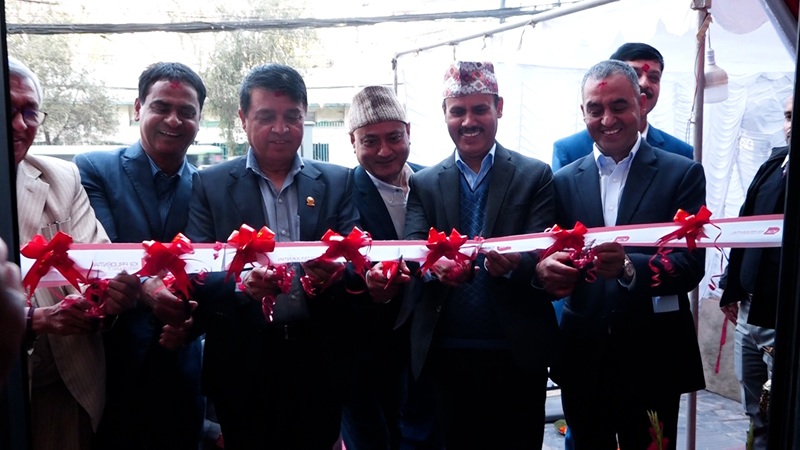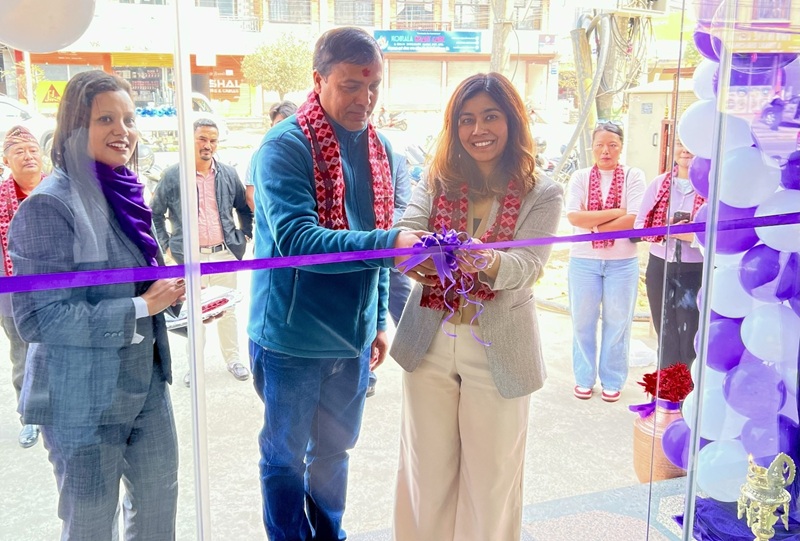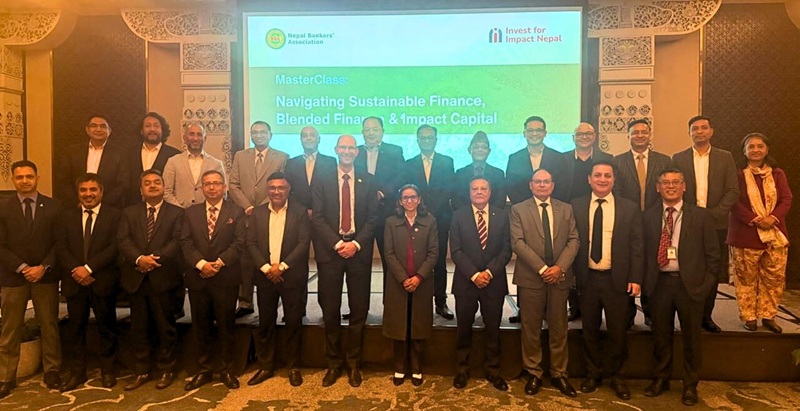The Future Of Transnational Education in Nepal: Charting a New Course For Global Learning
9th October 2024, Kathmandu
As Nepal confidently steps into the global arena, Transnational Education (TNE) emerges as a beacon of opportunity, bringing international degrees and curricula within the nation’s borders. TNE, where institutions from one country provide educational programmes to students in another, is poised to redefine higher education in Nepal. The future of TNE holds immense promise, aiming not only to equip Nepali students with global competencies but also to foster national development and socio-economic growth.
A Surge in Demand for Global Education
In recent years, there has been a significant increase in the number of Nepali students seeking quality education that aligns with international standards. This surge is driven by the desire to enhance domestic and international employability prospects. The global job market values qualifications recognised worldwide, and students are keen to gain a competitive edge. However, studying abroad can present financial and logistical challenges for many families. The high costs of tuition, accommodation, and living expenses in foreign countries can be prohibitive. Moreover, cultural adjustments and distance from family can pose additional challenges.
TNE is a solution that brings international education to Nepal, reducing the costs and challenges associated with overseas studies. It allows students to access world-class education without the financial strain of living abroad, effectively bridging the gap between global standards and local accessibility. TNE is particularly beneficial for working professionals seeking to upgrade their qualifications through postgraduate opportunities such as MBA (Master of Business Administration) and EMBA (Executive Master of Business Administration) programmes. These individuals often have limited options within the local education system and cannot afford to leave their jobs or relocate abroad for extended periods.
By offering flexible schedules and part-time study options, these professionals can apply global business principles learned directly to their current roles, enhancing their skills and advancing their careers while contributing to Nepal’s economic growth. This approach benefits the individual and enriches the local workforce with internationally trained talent.
Emerging Models of TNE in Nepal
Several TNE models are gaining traction in Nepal, each offering unique advantages and catering to diverse student needs. Collaborative partnerships between Nepali colleges and foreign universities are increasingly shaping Nepal’s higher education landscape. This trend reflects a broader shift towards the internationalisation of education within the country, aiming to enhance the quality and relevance of academic programmes. These international collaborations between local colleges can offer the potential of joint or dual degree programmes that blend international curricula with the local educational context, enriching students’ learning experiences and significantly boosting their employability in the global career market. Often, these programmes involve study periods in both Nepal and the partner country, allowing students to experience different cultures and educational environments firsthand. For instance, The British College has established collaborations with high-ranking universities in the United Kingdom. Such arrangements enable students to pursue degrees validated by foreign partners while studying at home, effectively bringing global education within reach. The TNE degree model broadens academic horizons and fosters cultural exchange and networking opportunities. Students interact with peers and faculty from diverse backgrounds, building international networks that can benefit their future careers. This collaborative approach enhances individual educational outcomes and potentially strengthens Nepal’s higher education system by introducing international standards and practices, fostering a global perspective among students and educators alike.
Acceptance of online and distance learning has surged, especially after the recent pandemic. Digital platforms have made international education more accessible, allowing students to engage with foreign curricula without leaving the country. Online programmes offer flexibility, enabling students to balance studies with personal and professional commitments. However, this model requires reliable internet connectivity and digital literacy, which are areas where Nepal is still developing. However, establishing and maintaining these partnerships requires careful planning and consideration of several factors. Ensuring the quality and accreditation of programmes is crucial, as both institutions must align curricula, assessment methods, and academic standards. Navigating administrative and cultural differences between educational systems can be complex, necessitating effective communication and mutual understanding.
Financial implications for students and institutions, including costs associated with international programmes, must be addressed through scholarships and funding options. Sustainability is also a key concern; long-term commitment from both partners is necessary to maintain programme quality and relevance, with regular reviews and updates to adapt to changing educational needs, providing reassurance about the adaptability of the system. Additionally, discussions are underway about establishing foreign university branch campuses in Nepal, which would significantly expand TNE’s footprint. Such campuses could provide state-of-the-art facilities and resources, elevating the quality of higher education. While this model requires substantial investment and regulatory support, it holds the potential to make Nepal a regional hub for international education.
Looking Towards the Future
The future of TNE in Nepal is filled with potential and promising opportunities, but it also presents challenges that require careful navigation. Investing in digital infrastructure could enhance the effectiveness of online and blended learning, extending TNE’s reach nationwide. The government’s Digital Nepal Framework aims to improve internet penetration and digital services, supporting the expansion of online TNE programmes. Access to high-speed internet and modern educational technologies is crucial for making digital learning more interactive and engaging. With strategic planning, Nepal could position itself as an educational hub in South Asia, attracting international students from neighbouring countries like India, Bangladesh, and Bhutan. Its unique cultural heritage, natural beauty, and affordability make it an attractive destination for quality education in a serene environment. This influx could boost the economy through educational tourism and foster multicultural interactions. TNE can enhance the capacity of Nepali educational institutions through exposure to international teaching methodologies and curricula, strengthening local academia. Faculty exchange programmes, joint research initiatives, and access to global academic networks can elevate the quality of education and research output. This symbiotic relationship benefits both local and foreign institutions, promoting innovation and academic excellence. Tailoring programmes to meet local market needs such as tourism, agriculture, renewable energy, and technology will make education more applicable and beneficial. Nepal has unique economic sectors that require specialised skills and knowledge. Integrating international best practices with local expertise can produce well-equipped graduates to drive national development. For example, degree programmes focusing on artificial intelligence, sustainability, and business entrepreneurialism can address specific industry demands.
Challenges to Address
Despite the optimistic outlook, several challenges should be addressed to ensure the sustainable growth of TNE in Nepal. Robust policies and quality assurance mechanisms are needed to regulate the TNE programmes effectively. Establishing a clear regulatory framework will enhance credibility and ensure that all programmes meet local and international standards. The absence of a developed centralised accreditation system can lead to inconsistencies in programme quality. The University Grants Commission (UGC) and the Ministry of Education should continue collaborating with international bodies to develop and improve standards and guidelines, especially in the face of significant changes with the introduction of artificial intelligence across the education sector. Aligning foreign curricula with Nepal’s socio-economic context is crucial for cultural relevance. Ensuring that programmes are meaningful and impactful requires adapting content to reflect local realities and needs. For instance, case studies, examples, and projects should consider Nepal’s economic conditions, cultural practices, and societal challenges. This localisation ensures that graduates can apply their knowledge effectively within the country.
Financial constraints still limit access for many students, so scholarships and financial aid programmes are vital for inclusivity. While TNE programmes are more affordable than studying abroad, they can still be expensive compared to local programmes. Establishing financial support mechanisms—such as need-based scholarships, grants, and flexible payment options—can make TNE accessible to students from diverse economic backgrounds. Enhancing both digital and physical infrastructures is essential for supporting advanced learning environments. Many institutions lack adequate facilities, such as modern, technology-equipped classrooms and robust IT infrastructure like high-speed internet and computer labs. Investments in these areas will benefit the TNE programmes and elevate the overall educational ecosystem in Nepal. Upgrading classrooms with interactive learning technologies and ensuring reliable IT infrastructure can significantly improve the quality of education.
Public-private partnerships could be a viable approach to mobilising resources for infrastructural development, enabling institutions to provide state-of-the-art facilities that meet international standards.
Policy Recommendations for Sustainable Growth
Strategic actions from both governmental and institutional stakeholders are necessary to harness the full potential of TNE in Nepal. One of the primary steps is establishing quality assurance bodies and developing robust accreditation standards to enhance TNE programmes’ credibility and acceptance. The government could form a dedicated agency to oversee these programmes, ensuring these colleges comply with international standards and local regulations. Regular published and transparent audits, evaluations, and rankings will facilitate and maintain high-quality education delivery, fostering trust among students, parents, faculty, and employers. Another crucial action is facilitating international partnerships by creating a proactive environment for collaboration that can attract more foreign institutions to engage in foreign direct investment opportunities in Nepal’s education sector. The government can encourage many more foreign universities to establish a physical presence in Nepal by simplifying bureaucratic procedures, offering incentives, and ensuring intellectual property protection. This approach expands educational offerings and brings diverse expertise and resources into the country.
Investing in faculty development is also essential for raising the overall quality of education. Training educators to deliver international curricula effectively can significantly enhance teaching effectiveness and enrich student learning experiences. Professional development programmes, workshops, and exchange opportunities can equip faculty members with the necessary skills and knowledge. Such initiatives enable educators to adopt international teaching methodologies and stay updated with global academic trends. Promoting inclusive education is vital to make TNE accessible to all segments of Nepali society. Implementing financial support systems, such as government-funded scholarships and collaborations with non-governmental organisations, can expand financial aid options for students. The active involvement of the private sector in funding scholarships and grants could also contribute to the economic sustainability of TNE, fostering a sense of hope for everyone’s future. Nepal can effectively develop its TNE sector by taking these strategic actions, making it a cornerstone of the country’s educational future. These measures will not only improve the quality and accessibility of higher education but also contribute to national development by producing graduates equipped with global competencies.
A Balanced Perspective
While TNE offers significant advantages and holds immense promise for Nepal’s educational future, it is essential to approach its expansion with a balanced perspective to maximise its benefits. Emphasising quality over quantity should be the guiding principle, ensuring that each degree programme meets high educational standards and truly enriches the student experience. With thoughtful implementation and oversight, TNE can uplift the entire educational sector, fostering innovation and excellence across institutions. Careful planning can prevent potential pitfalls, such as rapid, unchecked growth, which could lead to a proliferation of substandard programmes, potentially diluting educational quality. However, with diligent government oversight and the establishment of strict accreditation processes, Nepal can ensure that TNE programmes consistently offer added value to students and contribute positively to Nepal’s national development. This approach maintains educational integrity and enhances the country’s reputation as a destination for quality education. Additionally, while TNE opens doors to global opportunities, there is a concern about the risk of student brain drain, where talented graduates might seek opportunities abroad. Yet, this challenge can be transformed into an opportunity. By leveraging the skills and knowledge acquired through TNE programmes, Nepal can foster a new generation of professionals equipped to drive innovation and economic development within the country. Implementing strategies to retain talent, such as creating attractive local job opportunities, investing in emerging industries, and fostering entrepreneurship, can encourage graduates to contribute their expertise at home.
Success stories are already emerging. For instance, alumni from The British College have initiated startups, contributed to local communities, and brought international best practices to Nepalese businesses. These positive outcomes demonstrate how TNE can enhance the country’s human capital, leading to sustainable growth and prosperity. Furthermore, embracing TNE does not mean compromising Nepal’s rich cultural heritage. Integrating global education with local traditions can create a unique and enriching learning environment. Educational content should promote cultural exchange while celebrating Nepal’s history, values, and societal norms. By incorporating local case studies, languages, and cultural perspectives into international curricula, TNE programmes can produce well-rounded graduates who are globally competent yet deeply connected to their roots. This balanced approach ensures that students benefit from global exposure while preserving and strengthening national identity.
Festivals, traditions, and cultural practices can be shared within TNE institutions, fostering mutual respect and understanding among students and faculty from different backgrounds. Such initiatives enrich the educational experience and prepare students to become global citizens who appreciate diversity and contribute positively to society.
A Vision for Tomorrow
Transnational Education (TNE) stands on the cusp of transforming Nepal’s higher education landscape. By providing access to international standards of education locally, TNE empowers students and contributes significantly to national progress. As Nepal embarks on this transformative journey, the collaborative efforts of government bodies, educational institutions, and international partners will be pivotal. Thoughtful policies and investments can make TNE a cornerstone of Nepal’s future, bridging global opportunities and nurturing talent within this great nation. By charting this new course for global learning, Nepal is poised to make substantial educational strides, ultimately contributing to a brighter and more prosperous future for its people. The balance between embracing global educational practices and addressing local needs will define the success of TNE in Nepal. With careful planning and inclusive strategies, TNE can become a powerful catalyst for change, driving the nation toward sustainable growth and development.
Author, Dr Patrick McCrudden PhD Global Value Supply Chain








